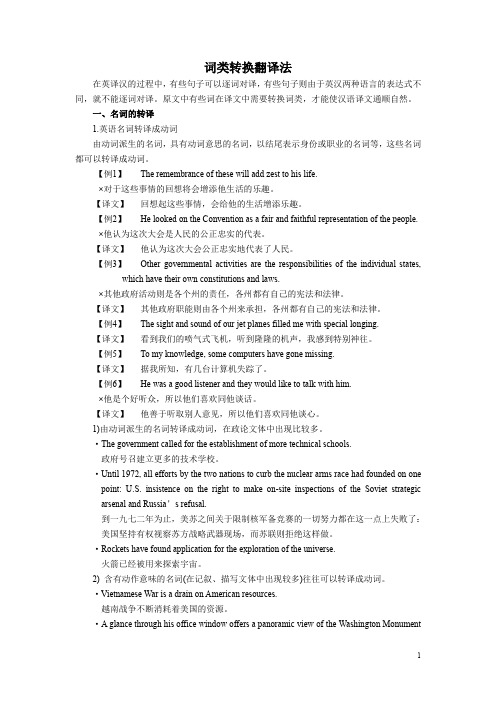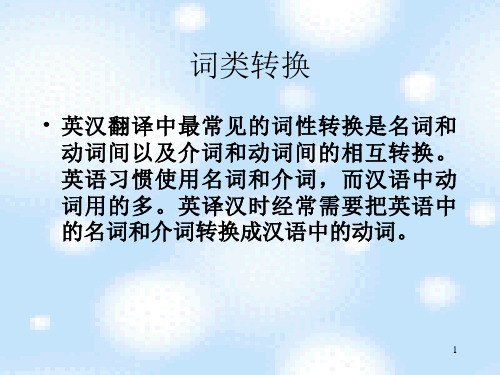英语翻译之词类转译法
英汉翻译之转换法

经典译例:
All the way along the line, from the border right up to Peking, as far as the eye could see, the countryside was literally covered up with a green carpet of growing crops, holding a promise of bumper harvests. 从边境乘火车直上北京,一路上极目四望,但见 一片片农作物茁壮成长,仿佛绿色的地毯覆盖 着整个田间乡野,到处是丰收在望的景象。
His wife had done everything possible to mother him. 妻子竭尽全力,像母亲一样照顾他。 The novel satirizes the marriage of convenience. 这部小说是对建立在利害关系基础上的婚姻的 讽刺。 With unemployment high, the dollar low and the stock market in distress, the economy will be the President’s sternest trial. 失业增多,美元贬值,股票市场不景气,经济 问题将成为总统面临的最严峻的考验。
由于汉语较少使用被动句形式,因此按照汉语 表达习惯,英语被动句往往译成含“被动意 义”的主动句形式,即不使用表示被动意义 的词和结构。
The United States has long been known as a “melting pot”. 美国历来以“民族熔炉”著称。 Almost every kind of climates can be found, but the continent lies mostly in the temperate zone. The board decides how school funds are to be allocated, and has some voice in establishing the curriculum. While some subjects are required of everyone, some high school students, in addition, take vocational classes. The Master of Arts degree occasionally may be obtained after one year of additional specialized study.
浅析英汉翻译中词类转换法的运用

浅谈英译汉中的英汉词性的转换英汉两种语言在词汇和语法结构方面有许多不同之处。
因此,在英译汉过程中,不能逐词逐句翻译。
一方面,汉语词大部分是一词一类,而英语常用词有许多都是一词多类,有的甚至多达五类。
另一方面,汉语一个词能充当的句子成分较多,一般无须转换词类;而英语一个词能充当的句子成分较少,充当不同成分需要转换词类。
翻译时,在忠实原意的前提下,可以把一些英语词性作适当调整,如英文的名词可以转为汉语的动词、副词以及形容词;英文的动词可以转为汉语的名词及副词等。
学过英语的人都知道,英语属于印欧语系,汉语属于汉藏语系。
英汉两种语言在词汇和语法结构方面有许多不同之处。
因此在英译汉的过程中,有些句子可以逐词翻译,有些句子则由于英汉两种语言的表达方式不同,就不能以“挖个坑填个萝卜”方法来逐词对译。
翻译时原文的有些词在译文中需要转换词类,才能使汉语译文通顺自然,即翻译时不必拘泥于原文的表层结构,可以在忠实原意的前提下将原文中有些词的词性转换为汉语的其他词性。
现将英语中的四类主要词性和汉语词性之间的转换介绍如下:一、英语名词的转换(一)英语的名词译成汉语的动词英语和汉语比较起来,汉语中动词用的比较多一些,在英语句中只用一个谓语动词,而在汉语句中可以几个动词连用,因此在一些情况下可以把英语的名词译成汉语的动词,这主要有下列两种情况:作为习语主体的名词往往可以转化为动词。
如:to have a rest中的rest,make no mention of中的mention,pay attention to中的attention,又如take care of中的care这几个词都是短语中的中心词,这些词虽然是名词,但几个短语表达的都是一种动作,再者,rest,mention和care本身既可作名词又可作动词,因此这样有动作意味的名词可以翻译成汉语的动词。
因此这几个英语短语中的名词可以翻译成汉语动词休息、提及、注意和照顾。
转译法

每天早上,她都要到湖区去散步。
The operation of a computer needs some knowledge of English.
操作电脑需要一些英文知识。
She jumped up for joy at the news of her husband’s return.
听到丈夫要回来这个好消息,她高兴地跳了起来。
Admission to the university is by examination and selection. Girls are admitted on equal terms with boys.
转译法
由于英语和汉语在句子结构和表达习 惯上的不同,机械地把英语的某一词 类译成汉语的同一词类,把英语的某 一成分,译成汉语的同一成分,显然 是不行的(反之亦然),有时需要转 换一下。这种做法,翻译界把它称为 “转换译法”或简称“转译法”。转 译法大量体现在词类转译和成分转译 上。
词类转换译法 Conversion of Words
They were considered insincere. 他们被认为是伪君子。 ③ 由名词派生的形容词可转译成名词。
The Wilde family were religious. 王尔德全家都是虔诚的教徒。
五、形容词转译成动词
①英语中形容词,尤其是表示感觉和感情的形容 词,往往具有动词的意义。因此在英译汉时表示 感觉和感情的形容词,在系动词后作表语时,往 往 可 以 译 成 动 词 。 如 : confident, certain, careful, cautious, angry, sure, ignorant, afraid, doubtful, aware, concerned, glad, delighted, sorry, ashamed, thankful, anxious 等。
词类转换翻译法

词类转换翻译法在英译汉的过程中,有些句子可以逐词对译,有些句子则由于英汉两种语言的表达式不同,就不能逐词对译。
原文中有些词在译文中需要转换词类,才能使汉语译文通顺自然。
一、名词的转译1.英语名词转译成动词由动词派生的名词,具有动词意思的名词,以结尾表示身份或职业的名词等,这些名词都可以转译成动词。
【例1】The remembrance of these will add zest to his life.×对于这些事情的回想将会增添他生活的乐趣。
【译文】回想起这些事情,会给他的生活增添乐趣。
【例2】He looked on the Convention as a fair and faithful representation of the people.×他认为这次大会是人民的公正忠实的代表。
【译文】他认为这次大会公正忠实地代表了人民。
【例3】Other governmental activities are the responsibilities of the individual states, which have their own constitutions and laws.×其他政府活动则是各个州的责任,各州都有自己的宪法和法律。
【译文】其他政府职能则由各个州来承担,各州都有自己的宪法和法律。
【例4】The sight and sound of our jet planes filled me with special longing.【译文】看到我们的喷气式飞机,听到隆隆的机声,我感到特别神往。
【例5】To my knowledge, some computers have gone missing.【译文】据我所知,有几台计算机失踪了。
【例6】He was a good listener and they would like to talk with him.×他是个好听众,所以他们喜欢同他谈话。
翻译技巧汇总 词类转译法

7
课堂练习
• 1.He who is subject to temptations tends to err. 2 Talking with his son, the old man was the forgiver of the young man's past wrong doings. 3 He had never been a medical student, yet he was given one of those rare honorary degrees of Doctor of Science.
8
课堂练习参考译文:
• 1.He who is subject to temptations tends to err. 不能抗拒诱惑的人往往要犯错误。 • 2 Talking with his son, the old man was the forgiver of the young man's past wrong doings. 老人在同儿子谈话时宽恕了年轻人过去的种种劣迹。 • 3 He had never been a medical student, yet he was given one of those rare honorary degrees of Doctor of Science 他从来没有上过医学院,但他却获得了理学博士这样难得 的荣誉学位
13
英语名词译成汉语动词时,修饰该名词的形容词往 往转译成汉语副词 • Below 4°C, water is in continuous expansion instead of continuous contraction. • 水在4摄氏度以下就不断地膨胀,而不是不断地收 缩。 • Only when we study their properties can we make better use of the materials. • 只有研究这些材料的特性才能更好地利用它们。
8.词类转译

12
8. 词类转译——汉译英的词类转换
2. 名词转译为动词
1) 结婚戒指是夫妇结合的象征。 A wedding ring symbolizes the union of husband and wife. 2) 工厂必须把增加产量作为自己的目标。 The factory must aim at an increase in production.
3
8. 词类转译——英译汉的词类转换
2. 动词转译为名词
A. 名词派生的动词 1) An interest in people’s deepest feelings characterizes all her writings. 对人们最深沉感情的关注,是她所有著作的特征。 2) She personifies beauty and grace.
她是美丽与优雅的化身。
B. 名词转用的动词 1) You can see what a Dodo looked like from the picture. 你可从照片中得知渡渡鸟的模样。 2) These exercises are designed to strengthen the muscles. 这些锻炼的目的是为了增强肌肉。
1) We have ruled out tool use and invention as ways of telling animal behavior from human behavior.
我们已经把使用和发明工具,从区分动物和人类行为的方法 中排除出去了。 2)Another way of dealing with enemies is either to have a very good protection or to be able to escape quickly. 还有一种对付敌人的方式是,要么防卫可靠,要么能够迅 速逃跑。
汉译英翻译技巧之转性词翻译.

• • • • • • • •
(三)形容词或副词转译介词或介词短语
• 英语中介词是非常灵活的,在句子中表达简练、精确。 因此,汉语句子中的形容词常常在英语中用介词或介词短 语表达。例如: 1)厨房又脏又乱。 The kitchen was in a mess. 2)父亲不赞成地看着他。 Father looked at him in disapproval
转性译法常用情况
• • • • • • • • • • • • 一、动词的转译 : 汉语的一个显著特点是大量使用动词,有时,一个句子会出现多个动词。而 英语中,一个句子通常只有一个主动词;汉语中动词使用比较频繁,当翻译 成英语时,常用名词、形容词、介词、副词等词来译 (1)医生建议我多锻炼一些。 The doctor gave me some advice of doing more exercise.(动词转译名词) ( 2)操作机器需要懂得机器的一些性能。 动词的转译 形容词或副词的转译 名词的转译 The operation of a machine needs some knowledge of its function(动词转 译名词) (3)他到商店去买酱油。 He went to the shop for a bottle of sauce.(动词转译介词) (4)一座跨越杭州湾的大桥已经开始建设。 A bridge has been under construction, which will span the Hangzhou Bay. (动词转译名词) (5)获悉贵国遭受地震,我们极为关切。 We are deeply concerned at the news that your county has been struck by an earthquake.(动词转译形容词)
英语翻译之词类转译法

名词→ 转译成动词
再如: Xu Beihong’s paintings of horses are exceptionally good. 原顺序:徐悲鸿的马的画像特别好。 改为:徐悲鸿画马画得特别好。 试译: Insulin is used in the treatment of diabetes. 胰岛素用于治疗糖尿病。 The government called for the establishment of more technical schools. 政府号召建立更多的技术学校。
名词→ 转译成动词
单击此处可添加副标题
英含有动作意思的名词转译成动词。 如:The thought of fat meat makes me sick. 一想到肥肉我就恶心。 A view of the village can be obtained from the tower. 从塔上可以看见这个村庄。 Tom looked his good-bye at the garden. 汤姆看了看园子,跟它告别。
1、英语中很多名词派生的动词或由名词转用的动词,在汉语中往往不易找到合适的动词,这时可以转译成名词。 例:The earth is shaped like a big ball. 地球的形状像个大球。 His speech impressed(使…印象深刻) the audience deeply. 他的演讲给听众的印象很深刻。 Socialist revolution aims (瞄准)at liberating the productive forces. 社会主义革命的目的是为了解放生产力。
- 1、下载文档前请自行甄别文档内容的完整性,平台不提供额外的编辑、内容补充、找答案等附加服务。
- 2、"仅部分预览"的文档,不可在线预览部分如存在完整性等问题,可反馈申请退款(可完整预览的文档不适用该条件!)。
- 3、如文档侵犯您的权益,请联系客服反馈,我们会尽快为您处理(人工客服工作时间:9:00-18:30)。
林则徐禁烟最为成功。 4) Being a successful organizer(组织者) of this football match, he still appears modest.
虽然成功举办了…
.
4、 作为习语主体的名词 常转译成动词:
例:Shall we have a rest? 我们休息一下,好吗? Let me have a try. 我来试一下。
.
d、 副词→转译成动词
例: Is he up yet? 他起床了没有?
As he ran out, he forgot to have his shoes on. 他跑出去时,忘了穿鞋子。
Please open the window to let fresh air in.
请打开窗子,让新鲜空气进来。 When he went back, the radio was still on, for he had forgotten to turn it off when he left. 他回来时,收音机仍然开着,因为他离开
龙生龙,凤生凤,老鼠的儿子会打洞!
9、WATCH SISTER
表妹
10、heart flower angry open
心花怒放
11、go past no mistake past
.
走过路过,不要错过
词 类 转 译 法 (Conversion of Parts of Speech): 就 是指在翻译过程中,根据译 文语言的习惯进行词类转换, 即把原文中属于某种词类的 词在译文中转换另一种词类, 从而使译文通顺自然。
He was criticized by his leader for failing to report the accident. 他由于未对事故进行汇报而受到领导的批评。
He was punished(处罚) by the school for cheating(欺骗的) in the exam. 他因考试作弊而受到学校的处分。
.
你父亲抽烟吗?
She is a real beauty.
她非常漂亮。
We are enemies(敌人) of all
wars.
我们反对一切战争。 He is the murderer(凶手) of his boss.
他谋杀了他的老板。
The earth is shaped(形状的) like a
.
爆笑的中国式英语
1、 how are you ? how old are you?
怎么是你,怎么老是你
2、 know is know noknow is noknow
知之为知之,不知为不知...
3.you don't bird me,I don't bird you
你不鸟我,我也不鸟你
4、you have seed ,I will give you some color to see see, brothers ! together up !
.
a) 名词→ 转译成动词
英语中大量由动词派生的名词和具有 动作意义的名词常可转译成动词:
1) 动词派生的名词转译成动词。 2) 含有动作意思的名词转译成动词。 3) 英语中有些加后缀的名词,不是指
其身份和职业,而是含有较强的动 作意味,通常转译成动词。 4)作为习语主体的名词常转译成动词。
.
名词→ 转译成动词
你有种,我要给你点颜色瞧瞧,兄弟们,一起上!
5、you me you me
彼此彼此
6、 You Give Me Stop!
你给我站住!
7、 we two who and who?
咱俩谁跟谁阿
8. dragon born dragon,chicken born chicken,mouse‘ son can make hole!
红军战士爬雪山,过草地,艰难地前进着。 The people are with him.
人民拥护他。 He came to my home for help.
他来到我家,请求帮助。 What are you after?
你追求什么?
.
C、形容词→转译成动词
英语中表示知觉、情感、欲望等心理状 态的形容词(如:afraid , thankful, certain, able, concerned, doubtful , grateful等), 在系动词后做表语时,常转译成动词。
动词派生的名词转译成动词:
如:The mastery(精通、熟练) of language is not easy and requires painstaking effort.
原顺序:语言的精通不是很容易 的,需要刻苦努力。
改为:语言这东西不是随便可以 学好的,非下苦功不可。
.
名词→ 转译成动词
胰岛素用于治疗糖尿病。
The government called for the establishment of more technical schools.
政府号召建立更多的技术学校。
.
名词→ 转译成动词
2、英含有动作意思的名词转译成动词。
如:The thought of fat meat makes me sick.
一想到肥肉我就恶心。
A view of the village can be obtained from the tower.
从塔上可以看见这个村庄。 Tom looked his good-bye at the garden. 汤姆看了看园子,跟它告别。
.
3、英语中有些加后缀的名词,不是指 其身份和职业,而是含有较强的动 作意味, 通常转译成动词。
Socialist revolution aims (瞄准)at liberating the productive forces. 社会主义革命的目的是为了解放生产力。
.
→转译成名词
2、英语被动句式,可译成“受到/遭到--+名词”或“予以/加以---+名词”结构;
例:The invasion of another independent country must be stopped. 侵犯另一个独立国家的行为必须予以制止。
例: Some of my classmates are good singers. 我同学中一些人唱歌唱得好。
Cf. She is a well-known singer. 她是一位著名的歌唱家。
I am afraid I can’t teach you swimming. I suppose my younger brother is a better teacher than I am. 恐怕我不能教你游 泳,我想我弟弟会比我教得好。
再如: Xu Beihong’s paintings of horses are exceptionally good.
原顺序:徐悲鸿的马的画像特别好。 改为:徐悲鸿画马画得特别好。
试译: Insulin is used in the treatment (治疗)
of diabetes. The government called for the
时忘记关了。
.
→转译成名词
1)名词派生的动词或由名词转 用的动词转译成名词;
2) 英语被动句式,可译成“受 到/遭到---+名词”或“予以/ 加以---+名词”结构;
3) 形容词转译成名词。
.
→转译成名词
1)英语中很多名词派生的动词或由名词转用的动 词,在汉语中往往不易找到合适的动词,这时 可以转译成名词。
.
汉英词类句法功能对照表
汉语
英语
名 主语;宾语;定语; 主语;宾语;
词 状语;谓语
表语;定语
形 容 词
定语;表语;主语; 宾语; 状语;谓语
定语;表语; 宾补
动 谓语;主语;宾语; 谓语 词 定语;表语
.
例: 1)这是一个很清楚的问题。 2)这个问题一定要搞得清清楚楚 3)问题很清楚。
1) This is a clear question. 2) The problem is quite clear. 3) The problem must be made clear.
big ball. .
英译汉过程中词类转换
▪ 翻译中的词类如何转译,要根据 原文词义、译入语的表达习惯等 而定, 通常有4 种情况:
▪ 1) 转译成动词 ▪ 2) 转译成名词 ▪ 3) 转译成形容词 ▪ 4) 其他词类转译
.
→ 转译成动词
英语和汉语比较起来,汉语中动词 用得多,而名词用得少,汉语可以 几个动词或动词性结构连用,而英 语句子中往往只有一个谓语动词。
establishment of more technical schools.
.
名词→ 转译成动词
再如: Xu Beihong’s paintings of horses are exceptionally good.
原顺序:徐悲鸿的马的画像特别好。 改为:徐悲鸿画马画得特别好。 试译:
Insulin is used in the treatment of diabetes.
He made no mention of his resignation.
他没有提到辞职的事。
.
b、介词→转译成动词
英语中含有动作意味的介词汉译时可 以译成动词。
例: The Red Army men struggled ahead, across the snow mountains and through the marshes.
例:Formality has always characterized(具有特征的) their relationship.
